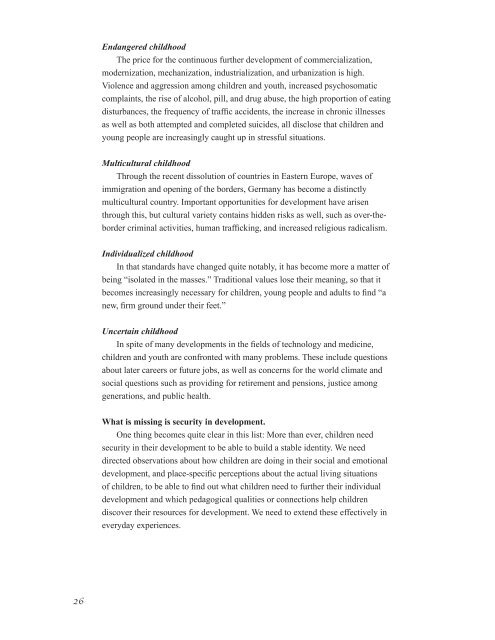Observing the Class Observing the Children - Research Institute for ...
Observing the Class Observing the Children - Research Institute for ...
Observing the Class Observing the Children - Research Institute for ...
You also want an ePaper? Increase the reach of your titles
YUMPU automatically turns print PDFs into web optimized ePapers that Google loves.
26<br />
Endangered childhood<br />
The price <strong>for</strong> <strong>the</strong> continuous fur<strong>the</strong>r development of commercialization,<br />
modernization, mechanization, industrialization, and urbanization is high.<br />
Violence and aggression among children and youth, increased psychosomatic<br />
complaints, <strong>the</strong> rise of alcohol, pill, and drug abuse, <strong>the</strong> high proportion of eating<br />
disturbances, <strong>the</strong> frequency of traffic accidents, <strong>the</strong> increase in chronic illnesses<br />
as well as both attempted and completed suicides, all disclose that children and<br />
young people are increasingly caught up in stressful situations.<br />
Multicultural childhood<br />
Through <strong>the</strong> recent dissolution of countries in Eastern Europe, waves of<br />
immigration and opening of <strong>the</strong> borders, Germany has become a distinctly<br />
multicultural country. Important opportunities <strong>for</strong> development have arisen<br />
through this, but cultural variety contains hidden risks as well, such as over-<strong>the</strong>-<br />
border criminal activities, human trafficking, and increased religious radicalism.<br />
Individualized childhood<br />
In that standards have changed quite notably, it has become more a matter of<br />
being “isolated in <strong>the</strong> masses.” Traditional values lose <strong>the</strong>ir meaning, so that it<br />
becomes increasingly necessary <strong>for</strong> children, young people and adults to find “a<br />
new, firm ground under <strong>the</strong>ir feet.”<br />
Uncertain childhood<br />
In spite of many developments in <strong>the</strong> fields of technology and medicine,<br />
children and youth are confronted with many problems. These include questions<br />
about later careers or future jobs, as well as concerns <strong>for</strong> <strong>the</strong> world climate and<br />
social questions such as providing <strong>for</strong> retirement and pensions, justice among<br />
generations, and public health.<br />
What is missing is security in development.<br />
One thing becomes quite clear in this list: More than ever, children need<br />
security in <strong>the</strong>ir development to be able to build a stable identity. We need<br />
directed observations about how children are doing in <strong>the</strong>ir social and emotional<br />
development, and place-specific perceptions about <strong>the</strong> actual living situations<br />
of children, to be able to find out what children need to fur<strong>the</strong>r <strong>the</strong>ir individual<br />
development and which pedagogical qualities or connections help children<br />
discover <strong>the</strong>ir resources <strong>for</strong> development. We need to extend <strong>the</strong>se effectively in<br />
everyday experiences.

















